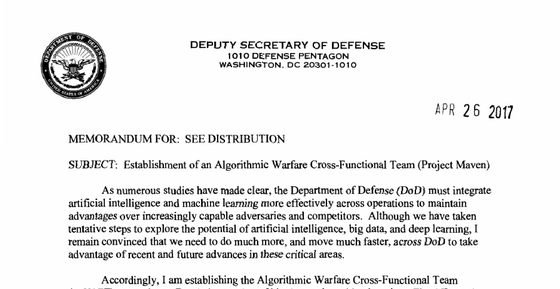The military AI project ``Project Maven'' led by the US Department of Defense is already in the practical stage, but there are concerns about data contamination by the enemy

The U.S. Department of Defense is promoting Project Maven , a military AI project that uses machine learning to analyze battlefield data to lock on to targets and suggest tactics, and has already been used on a trial basis in actual combat. , the economic newspaper Bloomberg reports.
AI Warfare Becomes Real for US Military With Project Maven
Project Maven is a Department of Defense initiative launched in 2017 to utilize AI in the military.
Project Maven DSD Memo 20170425.pdf
https://dodcio.defense.gov/Portals/0/Documents/Project%20Maven%20DSD%20Memo%2020170425.pdf

Initially , Google provided the technology , but in response to fierce internal opposition , Google declared that it would not use AI technology for weapon development, and decided not to renew the contract at the end of 2019. did.
Google declares that ``AI technology will not be used for weapon development'' and announces ``Principles for AI development'' - GIGAZINE

However, even after Google withdrew, Project Maven is still in progress, and at the time of writing the article, Palantir Technologies, an American data analysis company, is designing the main system. Ten companies, including Amazon Web Services and Microsoft, are also contributing, but none of them responded to Bloomberg's request for comment.
In Project Maven, an AI system called the 'Maven Smart System' analyzes vast amounts of multimedia data such as images and videos collected from the ground and in the air. AI performs image recognition, object detection, movement tracking, and more, identifying patterns and identifying important information from the analysis results.
Additionally, AI quickly provides analyzed information to military commanders and operational units. This enables quick decision-making and operational action. In addition, AI learns from operational data and results, creating feedback loops to improve algorithms and systems, increasing system performance and accuracy.

In the early days of Project Maven, AI only analyzed images and videos, but it also incorporates data from radar systems that can see in bad weather and darkness, and infrared sensors that detect heat. Now you can find things like engines and weapons factories.
In addition, by cross-referencing IP addresses, social media tags, and geolocation information, it is now possible to analyze non-visual information. According to Joey Temple, a senior US Army officer, with the help of Project Maven's AI, he can now acquire up to 80 targets in an hour.
In 2023, the Department of Defense handed primary responsibility for developing the Maven Smart System to the National Geospatial-Intelligence Agency (NGA), which specializes in map and image analysis. Since being taken over by NGA, Maven Smart System seems to have greatly improved its identification accuracy, and Project Maven has been designated as a ``program of record'' from the project under development. A 'program of record' indicates that a particular program or project receives official recognition and budget allocation.
When Russia invaded Ukraine in February 2022, a US Army engineer and the Maven Smart System were deployed to a German garrison and used to support Ukraine. The Maven Smart System was used to provide the location of Russian military equipment to the Ukrainian military, which used GPS guidance to destroy the targets with missiles, Bloomberg reports.

However, the accuracy of decisions made by Maven Smart System depends on the quality and quantity of learning data. When judging the situation in the desert of the Middle East, humans made the correct judgment with a probability of 84%, while Maven Smart System made the correct judgment with a probability of about 60%. This is because AI confuses trucks with trees and valleys. A military official said, ``The advantage of using the Maven Smart System algorithm is to speed up the process of making decisions,'' and it seems that it has not reached the level where decisions can be made tactically.
Additionally, as the U.S. and its allies rely on AI such as the Maven Smart System, adversaries could weaken the AI by intentionally lacing training data with error data or hacking software updates. There is also a possibility that
China is of particular concern to the US military. China is leading the way in machine learning technology, and there are concerns that it may be using its capabilities militarily. Bloomberg points out that this concern is behind the US government's tightening of export restrictions on AI semiconductor components to China in October 2023.
The US tightens restrictions on AI chip exports to China, making it difficult to export NVIDIA chips - GIGAZINE

In 2023, the Department of Defense issued a mandate to support human oversight, evaluation, and, where necessary, intervention in the decisions and actions taken by technical systems and algorithms. This is not a Maven Smart System, and emphasizes that humans have the final decision-making authority and are responsible for the system's decisions and recommendations.
Military officials say AI is no better than human decision-making. 'The U.S. military's AI systems are always supervised by humans and abide by the laws of armed conflict,' said Vice Admiral Frank Whitworth, head of the NGA. There are no plans to do so.'

Related Posts:
in Software, Posted by log1i_yk







